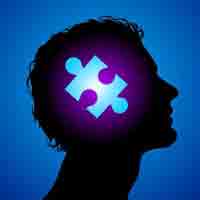|
DepressionMargaret McCraw, Ph.D age-well.org > ¨prevent age related diseases > depession
A Common Problem
Have you been really down for a long period of time, not understanding the reason for your bad moods and lack of energy? Are you isolating yourself from others because you never know how you will feel from one moment to the next? Have you noticed that friends and family members avoid spending time with you? Is living from day-to-day increasingly becoming a burden, with no light in sight? If you have answered yes to any of these questions, you may be experiencing a medical condition known as depression. Chronic Pain and Depressive Illness
Chronic pain and depressive illness are two of the most common health problems that health professionals encounter, yet only a small percentage of studies have investigated the relationship between these conditions (Currie and Wang, 2004). Stress and anxiety stemming from chronic pain, is frequently the source causing a major depression. Researchers estimate that depressive illness and anxiety occur in 20% - 50% of patients with chronic pain (source - www.backandneck.about.com). Major depression is thought to be four times greater in people with chronic back pain than in the general population (Sullivan, Reesor, Mikail & Fisher, 1992). In a recent study it was found that the rate of major depression increased in a linear fashion with greater pain severity (Currie and Wang, 2004). It was also found that the combination of chronic back pain and depressive illness was associated with greater disability than either of the two conditions on their own. There are key differences between chronic pain and acute pain. The nervous system processes chronic pain differently that acute or "immediate" pain. Acute pain occurs as a result of an incident or event, e.g. you fall down the steps and sprain your ankle. Chronic or "long term" pain happens over time and wears on the individual physically, emotionally, mentally and spiritually, often with no end in sight, causing the individual to feel more and more pessimistic. Pessimism is a persistent negative thought pattern, resulting in a sense of hopelessness, and severely damaging ones sense of well-being. Our emotions stem from our thoughts. When our "habit of thought" is negative, our emotions spiral downward, lowering our mood, energy level and spirit. In my opinion, depressive illness, simply put, is an extension of pessimism. The first step in changing these thought patterns and associated emotions is to understand what you are going through when experiencing a depression. The good news is you have the ability to make changes that will affect the way you feel and experience life on a day-to-day basis. Are you ready to release the depressive condition and re-experience having fun, laughter and pleasure with your family and friends? Of course you are, so read on to begin shifting your life in an upward and more positive direction. What is a Depressive Disorder?A depressive disorder is an illness that involves the whole person; mind, body, spirit and emotions. It affects the way a person perceives himself as well as his perceptions of the world, resulting in pessimism, hopelessness, sadness and often times anxiety. Depressive illness associated with chronic pain often stems from fear of not knowing how you will feel from moment-to-moment. Common Myths about depressionThe following are some common misconceptions which misguided people hold about depression. They believe, incorrectly that depressive problems are:-
How Widespread Is Depression?Depression affects men and women, young and old and individuals of all races, cultures, religions and incomes. Depression can occur at any age. Studies sponsored by the National Institute of Mental Health (NIMH) estimate that approximately 6 percent of children ages 9 to 17 in the U.S., and 10 percent of American adults, or about 19 million people ages 18 and above, experience some form of depressive illness every year. Although available therapies alleviate symptoms in over 80 percent of those treated, less than half of these individuals receive medical intervention (NIMH fact sheet on depression and cancer, 2002). The Personal Impact of DepressionThis condition has a catastrophic impact on the idividual:-
The Societal Impact of the ConditionThere is also a tremendous impact on society:
(source: Donald J. Franklin, Ph.D., www.psychologyinfo.com/depression)
Are You Depressed?
It is important to understand that depressive conditions and sadness are different. The death of a loved one, loss of a relationship, termination of a job, including retirement, will cause us to feel sad. Grief is a normal response to these situations. Individuals experiencing challenging times will often remark that he or she feels depressed. However, sadness, grief and depressive illness are not the same. Feelings of sadness and grief will lessen with time while depression can continue for months and years, if untreated. Does this seem like you? Read the following list and put a check mark next to each symptom that you are experiencing:
If you checked any of these boxes, call your doctor. Take the list to your physician and discuss options for treatment, if necessary. Source for list - National Institute of Mental Health/NIMH; some of the items in this list have been slightly revised; new items have been added from the original list provided by NIH. Continue to page 2 - Treating Depression age-well.org > ¨prevent age related diseases > depession More information on depression Return from depression to age-well.org |
Translate this Site
Search this Site
List of Conditions
|
Alcoholic Liver
|
|
Alzheimers Disease
|
|
Arterioslerosis
|
|
Age-Related Cancer
|
|
Cataracts
|
|
Cholesterol
|
|
Colds and Flu
|
|
Depression
|
|
Diabetes
|
|
Dementia
|
|
Dry Eye
|
|
Enlarged Prostate
|
|
Fibromyalgia
|
|
Glaucoma
|
|
Hair Loss
|
|
Halitosis
|
| Heart Attack
|
| Herniated Disc
|
|
High Blood Pressure
|
|
Incontinence
|
|
Influenza
|
|
Lower Back Pain
|
|
Macular Degeneration
|
|
Menopause
|
|
Osteoarthritis
|
Osteoporosis
|
|
Parkinson's Disease
|
|
Peri-Menopause
|
|
Presbycusis
|
|
Presbyopea
|
|
Prediabetes
|
|
Sarcopenia
|
|
Stroke
|
|
Shingles
|
|
Swineflu
|
Develop Smart Habits
|
Lose Extra Weight
|
|
Lose Bellyfat
|
|
Quit Smoking
|
|
Reduce Alcohol
|
|
Get Enough Sleep
|
|
Eat Healthily
|
|
Cut Down on Salt
|
|
Cut down on sugar
|
|
Avoid Transfats
|
|
Follow the DASH Diet
|
|
Drink Plenty of Water
|
|
Exercise Regularly
|
|
Manage Stress
|
|
Get Your 5 a Day
|
| Eat a Healthy Breakfast
|
|
Get Enough Calcium
|
|
Practice Good Oral Hygiene
|
|
Think Positive
|
Healthy Digestion
|
The Digestive System
|
|
The Intestines
|
|
Prevent Constipation
|
About this Site








